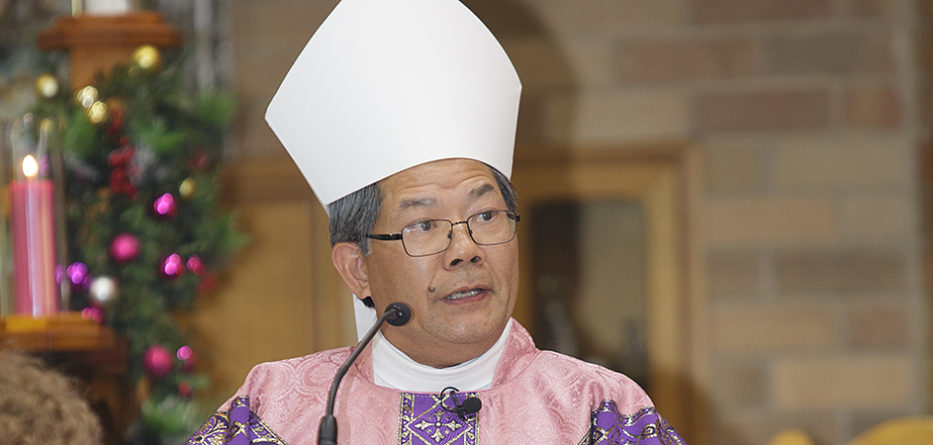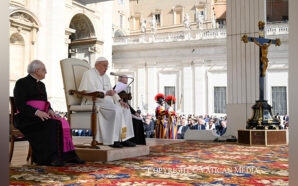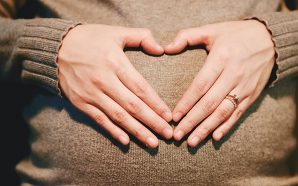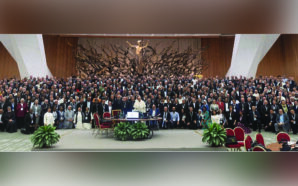Most Reverend Vincent Long Van Nguyen OFM Conv DD STL, Bishop of Parramatta
Homily for the Fourth Sunday of Lent (Laetare Sunday), Year A at St Gregory’s Church, Kurrajong, Parish of Richmond.
Readings: 1 Samuel 16:1, 6-7, 10-13; Psalm 22(23); Ephesians 5:8-14; John 9:1-41
19 March 2023
Seeing beyond our prejudices and biases
Dear sisters and brothers,
Few of us are free from prejudice. This innate fear is exacerbated particularly in times of adversity. Thus, for example, during the Second World War, Japanese Americans were regarded as potential enemies and put into internment camps. After 9/11, anti-Muslim sentiments increased across much of the Western World, including Australia. During the pandemic, the elderly, those on temporary visas and other vulnerable members of our society bore the brunt of the crisis.
The Word of God this Fourth Sunday in Lent speaks of the unexpected ways with which the God of our ancestors breaks through human barriers of gender, ethnicity, social status or disability. In Jesus, we meet this same God who acts yet more decisively and definitively in favour of the underprivileged and marginalised.
In the first reading, the prophet Samuel was sent to the house of Jesse in Bethlehem, in order to anoint the future king of Israel. Samuel was not blind physically. However, like other privileged people, he had a few blind spots. He evaluated the children of Jesse, one after the other, according to his cultural assumptions and biases. To his total surprise, the one deemed unworthy turned out to be the chosen of God. Samuel was taught a sobering lesson that day: “God does not see as man sees”. God’s way subverts human thinking.
It is a kind of sobering lesson that we all need to learn. We may be blessed with physical sight. But like Samuel, we need to have our eyes of faith wide opened; we need to expand our limited horizons so that we can see the way God wants us to see in the other. How often do our ingrained prejudices prevent us from accepting and respecting people who are different to us? We must be challenged as Samuel was, to see beyond our fears and biases.
This message is reinforced by the Gospel, which is a story full of rich symbolism and profound spirituality. Like the woman at the well story last Sunday, the man born blind is a victim of fear, misunderstanding and prejudice. He is judged and condemned by others. One is reminded of the way Job was similarly judged through the lens of the old reward and punishment binary. His friends maintained the old belief that God would only punish the guilty and reward the righteous in this world. Poor old Job was blamed for his predicament. He, like the blind beggar, was made an outcast and a sinner.
How often is that still the case even in our own days and in our own society? How often do we blame victims for their own failures – whether it is domestic violence, entrenched poverty, systemic oppression or intergenerational disadvantage. It is Jesus who shows us the way. “He was born blind so that the works of God might be displayed in him”, he declares. In this way, the traditional link between sin and one’s predicament no longer holds true. Jesus changes the way we view people who bear social stigma.
The blind man was receptive to the gift of sight and enlightenment. He recognised Jesus first as a healer, then, a prophet and finally as Lord. His journey of transformation is a sharp contrast to the descent into blindness on the part of Jesus’ adversaries. They judged him a sinner, then rejected his testimony and finally expelled him for his faith in Jesus. We can detect a sense of irony in all of this. It is the fully-sighted people who are guilty of ignorance, prejudice and hard-heartedness. The story makes it clear to us who have the gift of true vision. The story also gives us an insight into the experience of the predominantly Jewish Christian community who found themselves expelled from the synagogue.
Dear friends,
As we approach Holy Week, we are summoned to recognise that in God’s Kingdom, we wear no labels other than our identity as the children of God. In Christ, St Paul proclaims that “there is no longer Jew or Greek, slave or free, male or female”. Our faith makes us step beyond these human boundaries. It challenges us to align our personal biases and cultural assumptions with God’s vision.
When we survey Jesus’ interactions with the people, those who showed great faith, openness and receptivity to him were not always the standard bearers, not always those who were of his race, religion, or even kindred. Instead, we found to our surprise, they were the unlikely characters: the lepers, the beggars, the foreigners, the tax collectors, the prostitutes and sinners.
Let us renew our commitment to follow this way revealed to us in the example of Jesus. In the face of fear and stereotyping, let us be resolved to build a community of hospitality, compassion and solidarity, starting from those who are at the margins of our society. Like the blind man, may we be healed and made whole from the darkness of our fears and insecurities. May we be gifted with the new vision of faith that enables us to see and act according to the values of the Gospel. Let us pray that Christ open our eyes so we may see like him; our ears that we may hear like him and our hearts so we may love like him.








